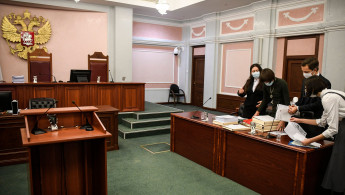Russia's supreme court orders rights group Memorial to close
Russia's Supreme Court on Tuesday ordered the closure of Memorial, the country's most prominent rights group, which chronicled Stalin-era purges and symbolised post-Soviet democratisation.
Judge Alla Nazarova ordered the closure of Memorial International, the organisation's central structure, and its regional branches for failing to mark all of its publications with a label of "foreign agent" as required by law.
The "foreign agent" legislation, which carries Stalin-era connotations, brands organisations receiving funds from overseas as acting against Russia's interests.
"Disgrace! Disgrace!" some supporters shouted in court after the ruling.
Prosecutors also accused Memorial International of denigrating the memory of the Soviet Union and its victories and rehabilitating "Nazi criminals".
During Tuesday's hearing a prosecutor said Memorial "creates a false image of the USSR as a terrorist state and denigrates the memory of World War II".
The court decision is the hardest blow yet to the organisation founded in 1989 by Soviet dissidents including Nobel Peace Prize laureate Andrei Sakharov.
Lawyer Maria Eismont said the shutdown was a "very bad sign" but added that Memorial would appeal and press ahead with its work.
"This is not the end," she told reporters.
Dozens of supporters gathered outside the courthouse in freezing temperatures and several people were detained. After the ruling, police demanded that members of the public and journalists disperse.
Memorial is a loose structure of locally registered organisations, with Memorial International maintaining the network's extensive archives in Moscow and coordinating its work.
The group has spent years cataloguing atrocities committed in the Soviet Union, especially in the notorious network of prison camps, the Gulag.
The move against Memorial caps a year that has seen authorities jail President Vladimir Putin's top critic Alexei Navalny, outlaw his organisations and crack down on independent media and rights groups.
But the ban against Memorial International stands out even in the current climate and would have been unimaginable just a few years ago.
Supporters say its closure signals the end of an era in Russia's post-Soviet democratisation process, which began 30 years ago this month.
Supporter Maria Biryukova said Russia needed Memorial to make sure the country did not repeat mistakes of the past.
"Memorial tells the truth, in no way does it denigrate the country," she told AFP.
Another supporter, author Leonid Bakhnov, whose grandfather was executed at the peak of Stalin-era purges in 1937, said the group's closure was "a tragedy for Russia".
"What a wonderful New Year they arranged for us," he said bitterly.
Memorial's founders have denied any serious violations, saying that only an insignificant number of documents may have been missing the tag.
Tuesday's hearing was one of two cases brought against the group. Prosecutors have also demanded a court close Memorial's Human Rights Centre, accusing it of condoning "terrorism and extremism" in addition to breaches of the "foreign agent" legislation.
On Wednesday, a Moscow court will hold a new hearing in that case.
The group has been in the crosshairs of the authorities for years and Putin has accused it of advocating for "terrorist and extremist organisations".
On Monday, a court in the northwestern city of Petrozavodsk increased a prison sentence for the head of Memorial in Karelia, Yury Dmitriyev, to a total of 15 years.
His supporters say he is being punished for his work locating mass graves of people killed under Soviet dictator Joseph Stalin.
Sentenced last year to 13 years in prison on what his supporters say were fabricated child sex charges, the 65-year-old will now spend two additional years in prison.
On Tuesday, Navalny's team said the authorities had detained the heads of his now-dismantled offices in the Siberian regions of Irkutsk and Tomsk, Zakhar Sarapulov and Ksenia Fadeyeva, who is also a local lawmaker.





 Follow the Middle East's top stories in English at The New Arab on Google News
Follow the Middle East's top stories in English at The New Arab on Google News
![The UAE is widely suspected of arming the RSF militia [Getty]](/sites/default/files/styles/image_330x185/public/2024-11/GettyImages-472529908.jpg?h=69f2b9d0&itok=Yauw3YTG)
![Netanyahu furiously denounced the ICC [Getty]](/sites/default/files/styles/image_330x185/public/2024-11/GettyImages-2169352575.jpg?h=199d8c1f&itok=-vRiruf5)
![Both Hamas and the Palestinian Authority welcomed the ICC arrest warrants [Getty]](/sites/default/files/styles/image_330x185/public/2024-11/GettyImages-2178351173.jpg?h=199d8c1f&itok=TV858iVg)